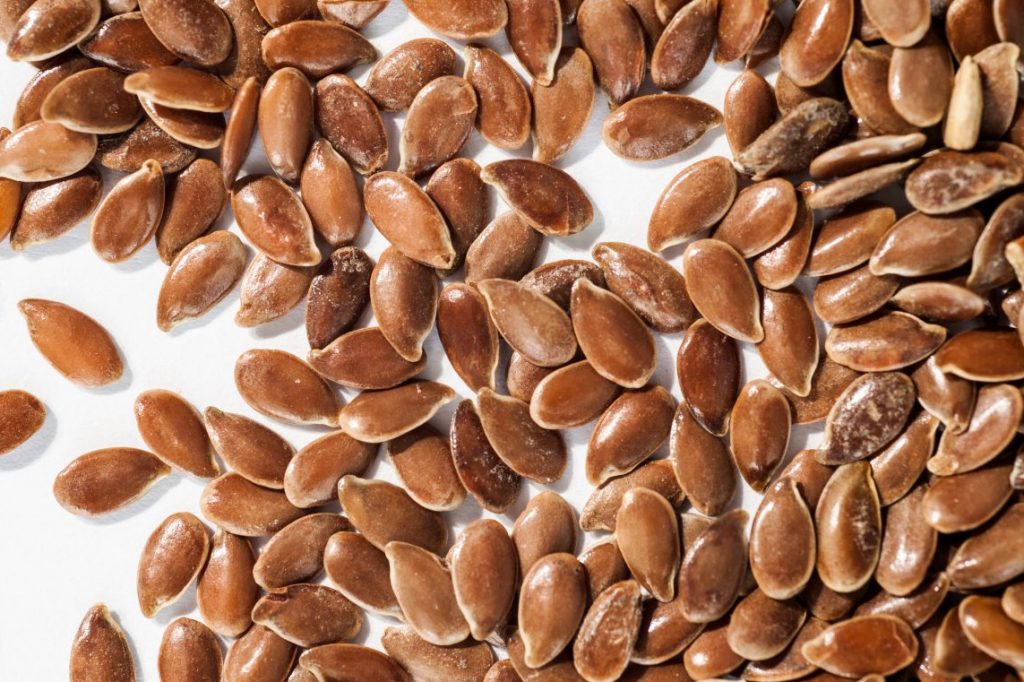
Dietary flaxseed, when used with soy isolates in animal studies, stops the growth-promoting effects of soy isolate on breast cells. It reduces tumor growth in patients with breast cancer.
In studies on mice, dietary flaxseed inhibited the growth of human estrogen-dependent breast cancer and strengthened the effect of tamoxifen on inhibiting tumor growth. When combined with tamoxifen, it decreased cyclin D1 (which promotes cell division), estrogen receptor alpha (which binds to the strong estrogens), human epidermal growth factor receptor 2 (promotes growth), and insulin-like growth factor I receptor in tumour cells (a strong hormonal link to breast cancer).
When mice consumed a diet containing 10% flaxseed, a 45% reduction in overall metastases and an 82% reduction in lung metastases occurred relative to a control group. Levels of insulin-like growth factor 1 and epithelial growth factor receptor in primary tumors was lower in the group of mice that consumed flaxseed. Studies on mice found that if female mice consumed flaxseed or its lignans while breastfeeding their young, chemically induced breast cancers were decreased in the offspring, suggesting that exposure to lignans at this early stage of mammary gland development reduces susceptibility to breast cancer later in life without adverse effects.
Dietary flaxseed can lower serum levels of estradiol, estrone and testosterone, especially in overweight women. Dietary flaxseed decreases vascular endothelial growth factor (VEGF) which otherwise acts to stimulate the formation of a blood supply to a developing tumour (angiogenesis).
Alpha linolenic acid, an Omega 3 oil found in flaxseed, decreases the activity of HER2/neu oncoprotein, and hence deters breast cancer tumour growth. It acts synergistically with Herceptin, improving the response to this drug. (On the other hand, omega 6 oils such as sunflower, sesame, safflower, promote activity of the HER2/neu oncoprotein). Omega 9 oil such as olive oil, acts with flaxseed oil to deter activity of the HER2/ne oncoprotein. Therefore, we advise a diet with a low omega-6/omega-3 polyunsaturated fatty acid ratio (i.e. at least twice as much omega 3 (from flaxseed, algae or fish) to omega 6 oil in one’s diet).
- Changes in biomarkers of estrogen receptor and growth factor signaling pathways in MCF-7 tumors after short- and long-term treatment with soy and flaxseed.
- Dietary flaxseed alters tumor biological markers in postmenopausal breast cancer.
- Dietary flaxseed enhances the inhibitory effect of tamoxifen on the growth of estrogen-dependent human breast cancer (mcf-7) in nude mice.
- Dietary flaxseed inhibits human breast cancer growth and metastasis and downregulates expression of insulin-like growth factor and epidermal growth factor receptor.
- Dietary flaxseed interaction with tamoxifen induced tumor regression in athymic mice with MCF-7 xenografts by downregulating the expression of estrogen related gene products and signal transduction pathways.
- Effect of dietary flaxseed on serum levels of estrogens and androgens in postmenopausal women.
- Exposure to flaxseed or its purified lignan during suckling inhibits chemically induced rat mammary tumorigenesis.
- Flaxseed and its components reduce metastasis after surgical excision of solid human breast tumor in nude mice.
- Flaxseed and its lignans inhibit estradiol-induced growth, angiogenesis, and secretion of vascular endothelial growth factor in human breast cancer xenografts in vivo.
- Flaxseed and soy protein isolate, alone and in combination, differ in their effect on bone mass, biomechanical strength, and uterus in ovariectomized nude mice with MCF-7 human breast tumor xenografts.
- HER2 (erbB-2)-targeted effects of the omega-3 polyunsaturated fatty acid, alpha-linolenic acid (ALA; 18:3n-3), in breast cancer cells: the “fat features” of the “Mediterranean diet” as an “anti-HER2 cocktail”.



